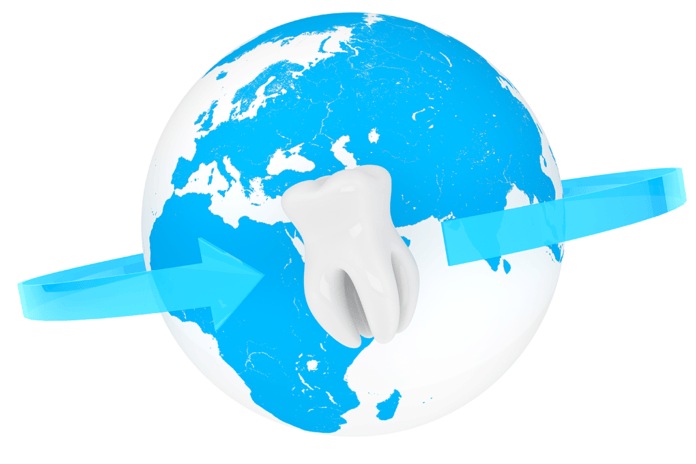Have you ever wanted to pack it all up and run away? Well, you can! Really! Dental hygienists are needed around the world. There are many different venues for hygienists to work and contribute in all four corners of the world. Dental hygiene is a growing worldwide profession, recognized in over 30 countries. These countries belong to the International Federation of Dental Hygienists (IFDH). Many countries do not have licensing boards or exams including Switzerland, Germany, Austria, Slovakia, Czech Republic, Portugal, Sweden, and UAE. If you are licensed in the EU, Finland and Ireland require no further exams. There are a few countries that allow outside dental hygienists to work, but this allowance is decided on a case-by-case basis, such as Norway (BSc required), South Africa, Italy, Malta and the UK.
The European DH Federation (EDHF) is another resource if you are looking to work abroad. One of the goals of the EDHF is to standardize education and licensure around the European Union and neighboring countries.
Another route to working abroad can be working on a military base of your home country. These jobs are usually posted on a government website such as with the Department of Defense. The U.S. Army, for example, posts their civilian dental positions on USAjobs.gov.
How I, as a Canadian Dental Hygienist, came to work in Germany
In 1992, I went to the IFDH symposium in Den Hague, Netherlands. There were posters and signs all over the place stating the urgent need for dental hygienists in Switzerland and Germany. I met a dental hygienist from the United States who was working in Munich, and we exchanged letters a few times. I was intrigued, so I went to Germany to scout it out and find a job.
In 1994, I started working in Munich at a Private Perio/Implant office, while learning German in the evenings. I was not 100% happy at that office, so I networked hard (pre-internet days!) to find another job. I did find a new office where I made a better income, received days off for holidays, and felt appreciated. During this time, I met dental hygienists from the United States, Canada, and South Africa. We got together regularly to chat and moan about working; we were each other’s support group. Most have since moved back to their home countries, but we are still in contact.
Dental Hygiene in Germany
Germany is a member country of both the IFDH and EDHF, although Germany itself does not fully recognize Dental Hygiene as a profession. However, the German Dental Hygiene Association (DDHV) is working hard to establish a fully accredited European Union-recognized University Program. That being said, about 100 foreign-trained dental hygienists are working in Germany within private practices.
Hygienists are able to work in Germany because there is a need for us. It has become complicated in the last years since every German state seems to offer a “hygiene course,” however they are not recognized, standardized, or accredited internationally. Most of these hygiene courses are 10-weekend seminars over the course of a year, and upon completion, students are deemed, dental hygienists. What is holding Germany back is the fact that the job and our daily tasks can be “delegated” by the dentist to whomever they choose. I am very lucky to be working in an office with four dental hygienists including myself from Canada, one from Italy, and two who are Swiss-trained. Makes for some great conversation, but at the end of the day, we all want what is best for the patient.
Before You Pack your Bags to Work in Another Country, Do your Due Diligence
Before you pack your bags, you need to find out what is required for the country you are considering living and working in. Finding a job might be easy, but getting your paperwork is not always an easy task. When I came to Germany, I had to wait almost three months for my paperwork, as they searched the EU for anybody who might have wanted my job before it was given to me. Every country has rules for residency, and work permission dependent on home country status so that you would have to research. However, most countries have immigration rules online.
International standards in periodontal and implant therapy are standardizing. Therefore practices and clinics are demanding dental hygienists to achieve the highest standard of patient care. Clinics are growing in many countries, especially the newer countries to the IFDH, like Russia and UAE. Often our clinic is asked how to employ a hygienist since they see and hear about the benefits of employing a highly-trained professional.
It’s a huge world out there, and as such, there are many opportunities to work or volunteer abroad. Mission trips and volunteering are another way to practice dental hygiene and see the world. For instance, East Meets West Dental has established a program in Vietnam. Many different church organizations or universities have mission trips to many places in South America, the Caribbean, and many other countries. What an opportunity we have as dental hygienists to give something back. For me, making a move changed my whole perspective on life, and I grew stronger in so many ways.












